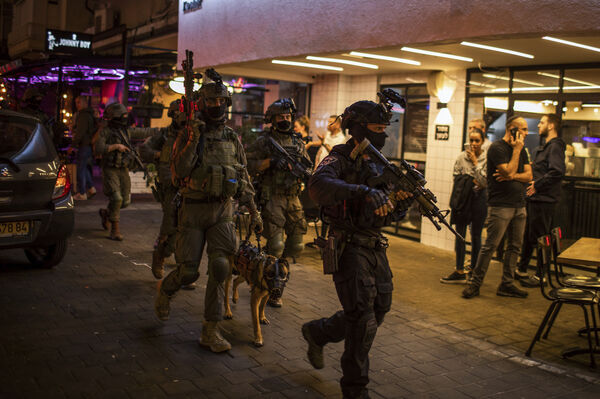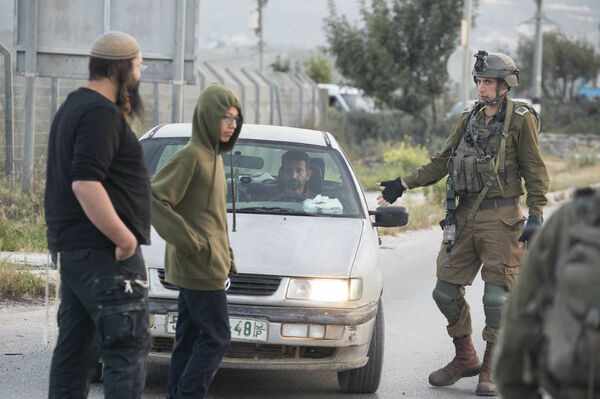Apr
12
2022
Welcome to the Tuesday News Bulletin! Jewish Currents is constantly getting quotes and scooplets from our network of sources, and every Tuesday, we release small stories exclusive to our newsletter subscribers in emails like this one. In addition to original reporting, the Tuesday News Bulletin serves as a forum for aggregating stories Jewish Currents staffers are tracking, with plenty of links to other publications so you can keep up with everything happening on our beats.
If you have more stories or tips, you can reach Isaac Scher at isaac@jewishcurrents.org.

Israeli security forces search for shooters after a suspected terror attack on Dizengoff Street in central Tel Aviv, April 7th, 2022.
April 12th, 2022
(note: Senior Reporter Alex Kane is on paternity leave; this is a guest post from Jewish Currents contributor Isaac Scher)
Since March 22nd, five Palestinian assailants have killed 14 people in Israel in four separate attacks. Two of the attackers lived in the West Bank, the other three in Israel. The Islamic State, or ISIS, claimed responsibility for one of the attacks; the attacker in a separate incident was affiliated with the group. A member of Islamic Jihad, a militant group in the West Bank, carried out the most recent attack, in Tel Aviv. “The city shut down when he was on the loose,” Dahlia Scheindlin, a political scientist and a member of the Jewish Currents advisory board, said. “Thursday is usually a party night, but the city was totally empty. It was swarming with officers, helicopters, and cop cars in all directions.” The next morning, the attacker was found and killed.
Israel’s retributive violence has been swift. Since the first of the four attacks, the Israeli government has allocated $56 million to Israeli police in “emergency” funds and $112 million to construct a new stretch of separation wall dividing the West Bank from Israel. According to Defense Minister Benny Gantz, the military has arrested 200 people and could arrest “thousands” more. Military raids in the West Bank continue at a record-high clip. When Israeli settlers threw stones at residents of the Palestinian town of Tuba and destroyed some of their property last week, Israeli authorities instead arrested a Palestinian resident, who they charged with throwing stones, fined, and temporarily banned from the town.
On April 10th, the Israeli military killed four Palestinians. One was a woman near Bethlehem who was shot while crossing the street; the military claimed she had approached soldiers in a “suspicious manner.” Another woman was killed after stabbing a Border Police officer in Hebron. A man from Hebron, protesting southwest of Bethlehem, was killed for hurling a firebomb at a motorist on a Jews-only road that connects Jerusalem to an Israeli settlement. The same day, a 17-year-old Palestinian boy from Jenin shot at soldiers from his motorbike. A soldier shot back with expanding bullets, which balloon on impact and are prohibited by international law. The boy was hit and hospitalized; he died the next day. A second Palestinian boy, 16, died the same day after being shot while “looking on the ground for stones” to throw at Israeli soldiers, according to the human rights group Defense for Children International–Palestine. “It’s all escalation,” Scheindlin said. “This is a tit-for-tat conflict. When people are dying, you have anger and revenge. That’s the cycle.”
Palestinian violence is a reaction to the “incessant pressure on Palestinians from so many different sources,” Khaled Elgindy, director of the Middle East Institute’s program on Palestine and Israeli–Palestinian affairs, told Jewish Currents. Among the sources of pressure, he said, are military operations and settler raids in the West Bank and regular internal displacement. Further, Palestinians find little political representation in the Palestinian Authority or Hamas—or in once-allied states in the Middle East, several of which attended the recent Negev Summit cementing “normalized” relations with Israel. “Asymmetry is driving the conflict. One side can impose its will, and the other cannot,” Elgindy said.
Israel, for its part, cites security as the prime motivation for its responses to Palestinian violence. When Raad Hazem shot and killed two people at a bar in Tel Aviv on April 7th, the Israeli government sanctioned Jenin, where Hazem lived. The city of 40,000 is now almost totally locked down during the holy month of Ramadan. Residents with jobs in Israel will be allowed to travel to and from Jenin for their shifts, but Israel has revoked the travel permits of 5,000 residents, preventing them from crossing the Green Line. Palestinian citizens of Israel have also been barred from visiting the city, as they frequently do. The al-Aqsa Martyrs’ Brigade, an armed group affiliated with the governing Fatah party, reportedly deployed militants to Jenin the day after Israel leveled sanctions on the city. Locals are barricading the city in advance of a possible military operation, according to social media reports. Akram Rajoub, the governor of the Jenin district, described the sanctions as collective punishment. “Israel takes security measures against the Palestinians every day, including harming innocents, and there’s no judge and no justice,” he told Haaretz. “Instead of creating deterrence, it will cause escalation.”
As violence escalates, Elgindy points out that Israel, in its quest for control, has delegitimized nonviolent resistance by Palestinians. Israeli leaders have long vilified the nonviolent Boycott, Divestment, Sanctions (BDS) movement as antisemitic, for example, and Israeli soldiers have regularly shot and killed unarmed protesters at weekly events in the West Bank and Gaza. Last year, the Israeli government officially designated six Palestinian human rights groups as “terrorist organizations.” This limiting of dissent, Elgindy said, has lessened “the costs of engaging in violence” in the eyes of many Palestinians.
Young Palestinians, in particular, have turned away from nonviolence, Dana El Kurd, a political scientist at the University of Richmond, told Jewish Currents. “After the Second Intifada, there were a number of attempts to create nonviolent mobilization around a number of issues. All of those fizzled out,” she said. Simultaneously, “the Palestinian territories experienced worsening conditions and less of an ability to coherently face them,” both at the level of grassroots activism and, given the corruption of the Palestinian Authority, that of electoral politics. Although last year’s Palestinian uprising against Israel, known as the Unity Intifada, briefly appeared to revive mass mobilizations, it was “not as sustained as people wanted,” El Kurd said, increasing the perception that strategies of nonviolence “are complete dead ends.” Even before the Unity Intifada, according to El Kurd’s polling research, Palestinians in the occupied territories preferred strategic violence to strategic nonviolence. “They’re not Islamists and they’re not pro-Hamas,” she said. “They are often on the left. Ideologically they are very opposed to the groups putting up these attacks. If even the most ideologically opposed people support violence, that says something about the broader society.”

Israeli settlers block main roads around Nablus in the West Bank to protest recent Palestinian armed attacks. The settlers attacked Palestinian vehicles; Israeli forces did not act to prevent the settlers’ attacks. Meanwhile, the Israeli army closed several military gates to Palestinian areas and turned back Palestinian traffic.
As part of the Tuesday News Bulletin, Jewish Currents is publishing a photograph taken by members of Activestills every week, archiving ongoing dispossession and resistance from the river to the sea. You can find more information on this collaboration here.
-
On Monday, Israeli Foreign Minister Yair Lapid appointed Noa Tishby as special envoy for combating antisemitism and delegitimization. The actor, who lives in Los Angeles and Israel, will serve as an advocate against “the rise in antisemitism,” she told Jewish Insider. “I will educate whoever is willing to listen.” The special envoy position is newly created, suggesting a renewed Israeli effort at garnering support for the state. “The creation of this post and the appointment of Noa Tishby is another step that will strengthen Israel and our fight against antisemitism internationally at a moment when Jews around the world once again face an alarming and dramatic resurgence in antisemitism,” Lapid said.
-
At least five senior European Union officials were surveilled with software developed by the Israeli surveillance firm NSO Group, Reuters reported on Monday. The targets all work at the European Commission, the EU’s executive body. The only named target was Didier Reynders, the justice commissioner. (It is not clear who was responsible for the hacks.) In January, The New York Times reported that the FBI purchased the NSO Group’s spyware in 2019 for domestic use but decided against it. The firm’s software has been used by repressive governments like the United Arab Emirates, Djibouti, and Saudi Arabia, the latter of which allegedly used it to spy on the Washington Post columnist Jamal Khashoggi, who Saudi operatives killed in 2018.
-
On Sunday, the Knesset member Ayman Odeh, who leads the Joint List alliance of Arab-majority political parties, urged Palestinian members of Israeli security forces to quit their jobs. “I call on those who have enlisted, who are a small minority, between 1 and 1.5 percent, throw your weapons in their faces,” Odeh said. “We don’t need to be with them, not part of this crime, but rather on the same side as our people, in order to end the occupation.” The Israeli police asked a state prosecutor to determine whether Odeh’s comments constituted criminal incitement.
-
Last week, Republican Sens. Rick Scott and Mike Braun introduced legislation that would bar the US government from financially supporting Amnesty International or its employees. The human rights organization, which has reportedly received about $2.5 million in government funds over the past 20 years, published a landmark report on February 1st charging Israel with the crime of apartheid. The two lawmakers said in a joint statement that the report was an affront to “America’s strongest ally in the Middle East.” Scott described Amnesty’s report as emblematic of “the radical left’s dangerous anti-Israel agenda.”
-
Last week, an attorney for the Mossad, Israel’s national intelligence agency, told the Israeli Supreme Court that the agency could not locate documents concerning its links to the Christian militias that carried out the 1982 Sabra and Shatila massacre of Palestinian refugees in Lebanon. The court case began with a petition by dozens of human rights organizations pursuing the documents. “This secret case needs to come to light,” the petition says, “to also permit a public discussion and learn the lessons that might prevent continued support by the Mossad and the State of Israel for security forces and militias around the world that are perpetrating atrocities.” By Israeli law, Mossad is required to maintain its documents for 90 years, at which point they are opened to the public. Historians and human rights advocates frequently seek the declassification of state documents.